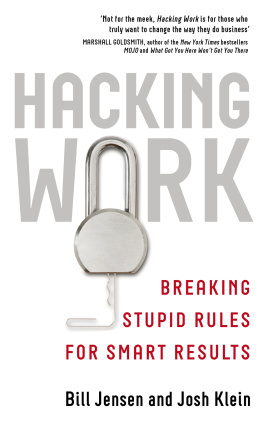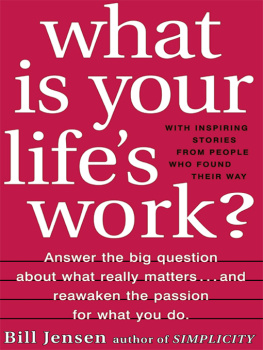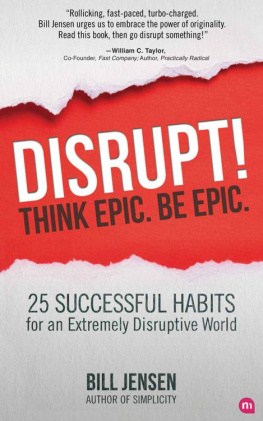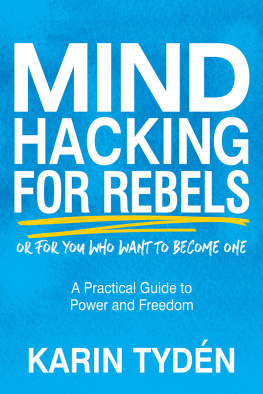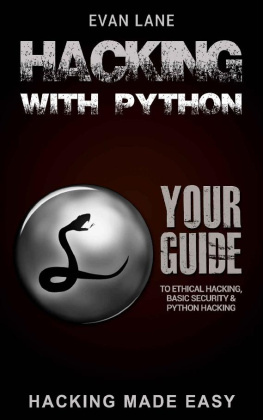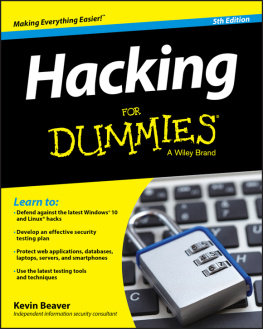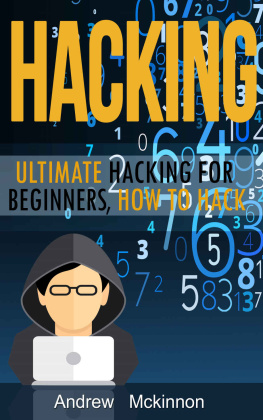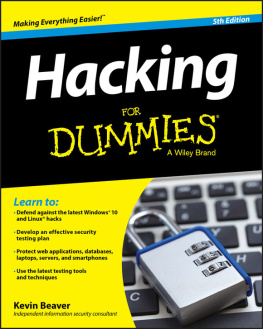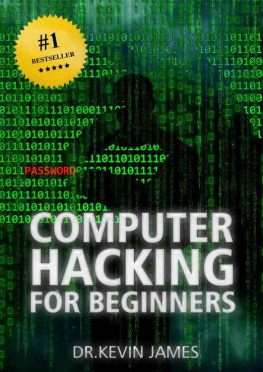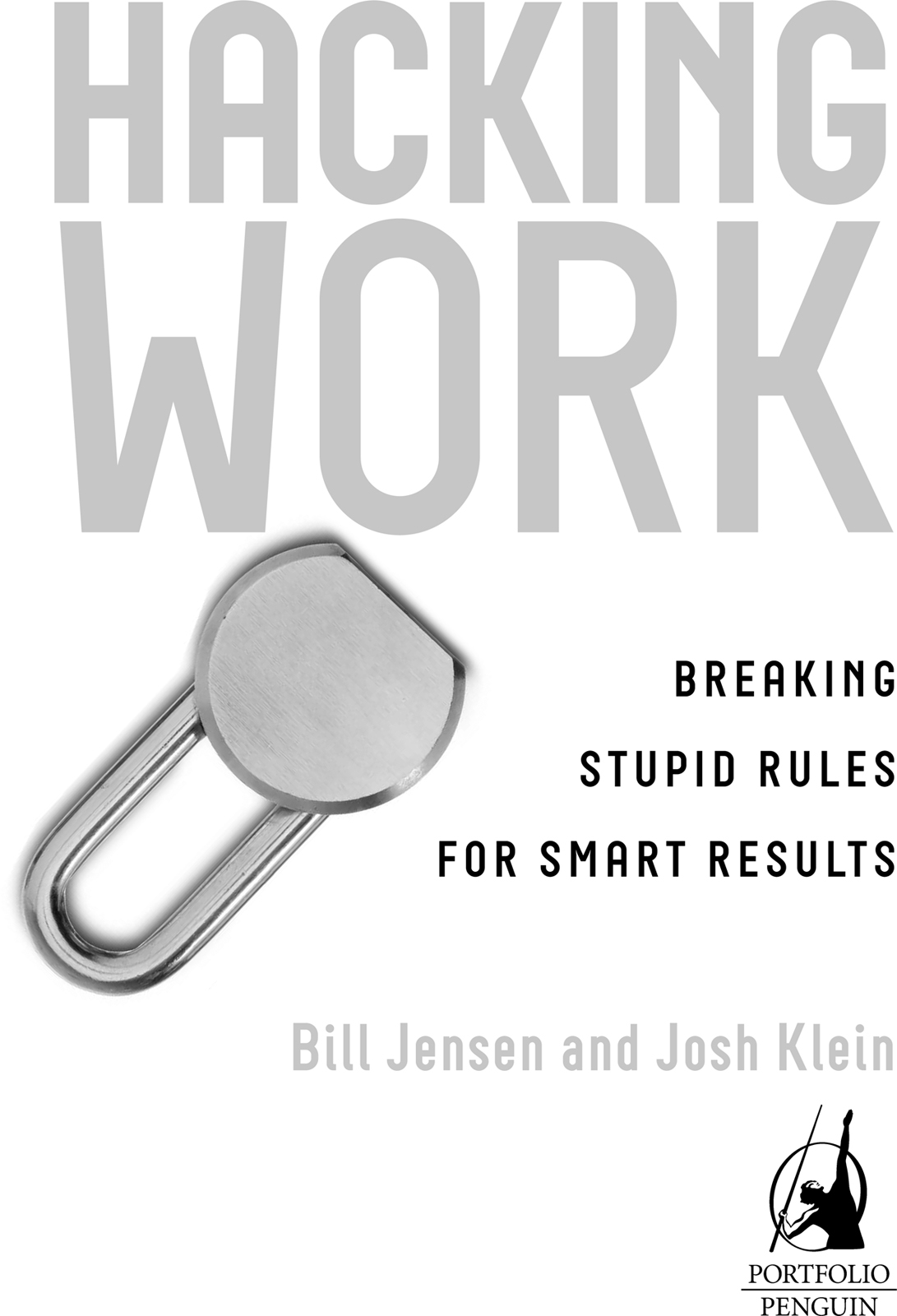PORTFOLIO PENGUIN
Published by the Penguin Group
Penguin Books Ltd, 80 Strand, London WC2R 0RL, England
Penguin Group (USA) Inc., 375 Hudson Street, New York, New York 10014, USA
Penguin Group (Canada), 90 Eglinton Avenue East, Suite 700, Toronto, Ontario, Canada M4P 2Y3
(a division of Pearson Penguin Canada Inc.)
Penguin Ireland, 25 St Stephens Green, Dublin 2, Ireland (a division of Penguin Books Ltd)
Penguin Group (Australia), 250 Camberwell Road, Camberwell, Victoria 3124, Australia
(a division of Pearson Australia Group Pty Ltd)
Penguin Books India Pvt Ltd, 11 Community Centre, Panchsheel Park, New Delhi 110 017, India
Penguin Group (NZ), 67 Apollo Drive, Rosedale, North Shore 0632, New Zealand
(a division of Pearson New Zealand Ltd)
Penguin Books (South Africa) (Pty) Ltd, 24 Sturdee Avenue, Rosebank, Johannesburg 2196, South Africa
Penguin Books Ltd, Registered Offices: 80 Strand, London WC2R 0RL, England
www.penguin.com
First published in the United States of America by Portfolio Penguin, a member of Penguin Group (USA) Inc. 2010
First published in Great Britain by Portfolio Penguin 2010
Copyright Bill Jensen and Josh Klein, 2010
The moral right of the authors has been asserted
All rights reserved
Without limiting the rights under copyright reserved above, no part of this publication may be reproduced, stored in or introduced into a retrieval system, or transmitted, in any form or by any means (electronic, mechanical, photocopying, recording or otherwise), without the prior written permission of both the copyright owner and the above publisher of this book
A CIP catalogue record for this book is available from the British Library
ISBN: 978-0-14-196566-6
ABOUT THE AUTHORS
Bill Jensen is CEO of the Jensen Group, a change consulting firm he founded in 1985, and an internationally acclaimed speaker. He lives in Morristown, New Jersey.
Josh Klein hacks institutions, computer networks, hardware and more. He consults for groups such as Microsoft, Nokia and the U.S. intelligence community. He lives in New York.
Hacking Work
Bill and Josh will help you break free of the shackles of how business is traditionally done and leverage the power of hacking to solve your companys most intractable problems
Eric Ryan, chief brand architect and co-founder, Method
The way were working today sucks. If youve realized that fact, and your organization isnt doing anything about it, Hacking Work will help you achieve your results and not go insane waiting for those around you to wake up
Cali Ressler and Jody Thompson, co-creators of the Results-Only Work Environment (ROWE) and co-authors of Why Work Sucks and How to Fix It
Anyone frustrated by burdensome rituals and processes can now take responsibility for their own success. Jensen and Klein irreverently and cleverly show us the power of hacking work and taking responsibility for ones own success. The ideas within Hacking Work will foster the innovation and creativity so badly needed in these times
Dave Ulrich, professor, Ross School of Business, and co-author of The Why of Work
Hacking Work is a refreshing antidote to what passes for business wisdom today. Sure, organizations need structure and processes. But to get your work done, you need this book. Its the perfect manual for long-overdue corporate insurgency. Find a way to hide it on your expense account!
Thomas H. Davenport, Presidents Distinguished Professor of IT and Management, Babson College, and co-author of Analytics at Work
The time has come to accept that our outdated business precepts are unraveling. Jensen and Klein reveal a new hope: businesses succeeding and innovating in spite of themselves. A brave new world is upon us we can embrace it and excel or deny it and die
Jim McCarthy, consultant and former EVP, Strategic Development, CITGO Petroleum
Hacking Work is a badly needed wake-up call urging executives to remove the manifold limitations standing in the way of true innovation. This book could not be more timely: As our economies move out of recession, it is high time to question and redesign every aspect of doing business that creates obstacles to competitiveness
Jean-Daniel Gerber, State Secretary, Ministry of the Economy, Switzerland
Dedication
To the underground army of benevolent hackers who are saving business from itself, one bad act at a time.
Bill and Josh
To my folks, for giving me the courage to love what I do and to do what I love. They taught me to hack the right waywith courage and respectand I thank them for it.
Josh
PREFACE
PSSSSSST
For several years we have foraged in the back alleys of business, arranging clandestine meetings with the bad boys and girls of work. Empty cans of Red Bull, pizza crusts, and shredded nondisclosure agreements littered our meeting places.
Psssssst. How do you really get everything done? What are your work-arounds? The ones that keep your company afloat, keep customers happy, teammates employed, and keep you doing your best? We want the world to know about the power of benevolent hacking.
Who are we, and why do that? Were just two guys who have dedicated our professional lives to finding work-arounds to corporate bullshit.
Bills day job is making it easier to get stuff done. Over the course of two decades, he has asked over five hundred thousand people around the world what makes their work so hard and complicated. C-suite dwellers love his findings on simplicity. Bill advises executives and their troops on how to work smarter by making work simpler. He has consulted with many of the biggest companies in the world, local and federal governments, even the U.S. Navy SEALs.
But Bills most important advice has always hit a brick wall. His research has consistently found that the number one source of work complexity is built into every companys infrastructurethe tools and processes we are supposed to use to get our work done. They are designed to help the company succeed but are not built for the success of the individuals who do the work.
Businesss failure to deal with this obvious problem is one of its biggest problems. Yet the reaction from most graybeards has been decidedly chilly: Lets not go there.
Arrrrgh! How do I get these people to listen? Bill wondered. Addressing this problem would be game changing a true competitive advantage for every company and the end of so much frustration and wasted effort for every individual.
The answer finally appeared over drinks at a TED (Technology, Entertainment, Design) conference. Change the approach, said Josh, who had just presented how he had hacked the work ethic of crows by training the birds to bring him money. If their executives wont listen, lets show employees how to hack around their problems.
From his early days of snarfing Wi-Fi passwords in Seattle to his recent consulting work with U.S. intelligence agencies, Josh has been hacking technologies and putting them back together to great effect. Some years ago, he noticed that this kind of systems thinking could be applied to people and organizations, not just to technology.
As he helped companies all over the world make the most of their technologies, Josh saw firsthand how unwilling people are to question what they take for grantedand how powerful it can be to do so. From megacorporations to start-ups, from investors to students, he found that while everyone talked about innovation, few were willing to pull the trigger that would kill an old business model or to embrace the changes that would create a new one.

